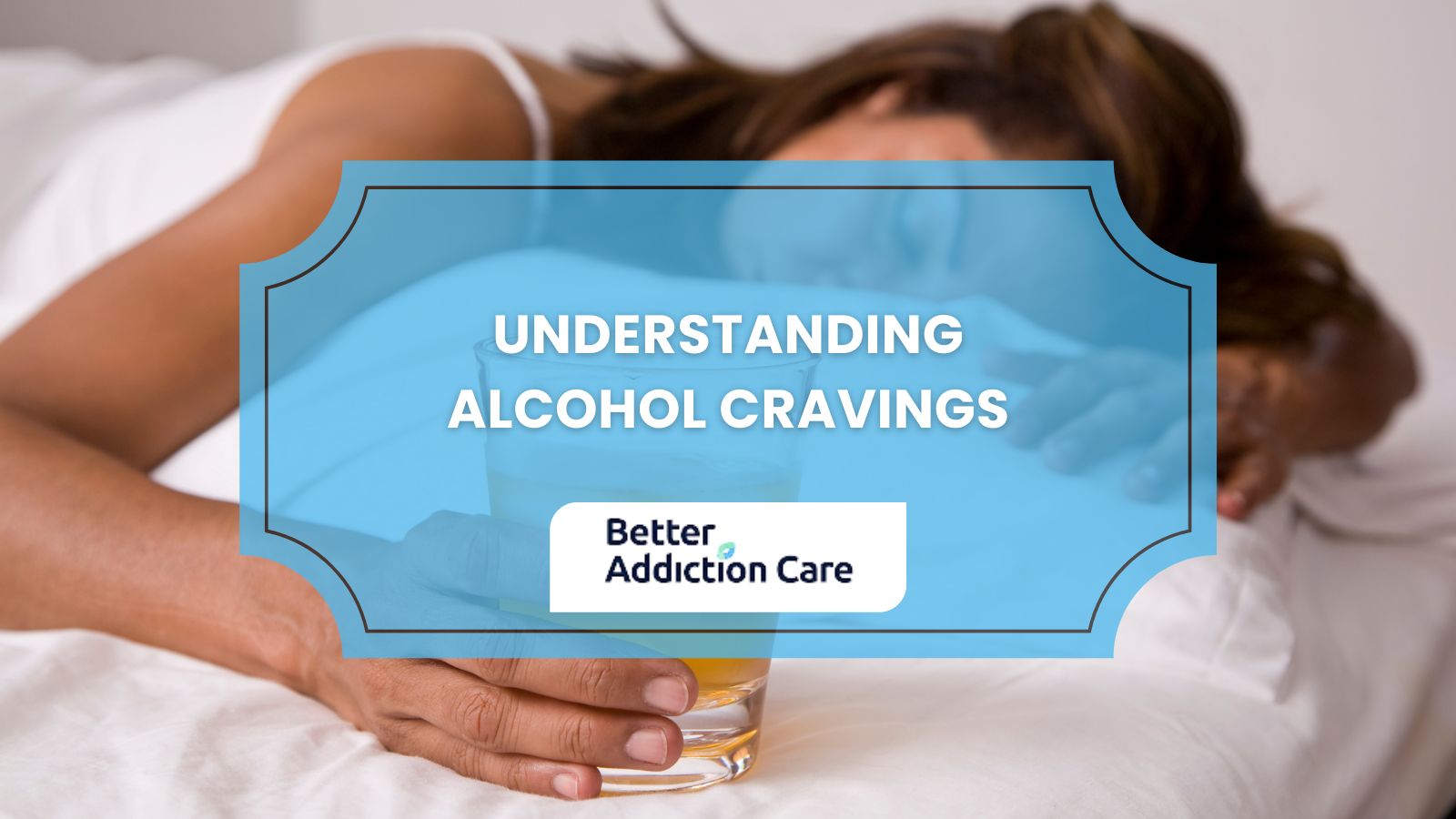Understanding Alcohol Abuse vs Alcoholism
If you're wondering about the difference between alcohol abuse and alcoholism, it comes down to physical dependence. With alcohol abuse, you experience negative consequences from drinking, but aren't physically dependent. Alcoholism (or AUD) means you've developed a chemical dependence that makes it much harder to stop.
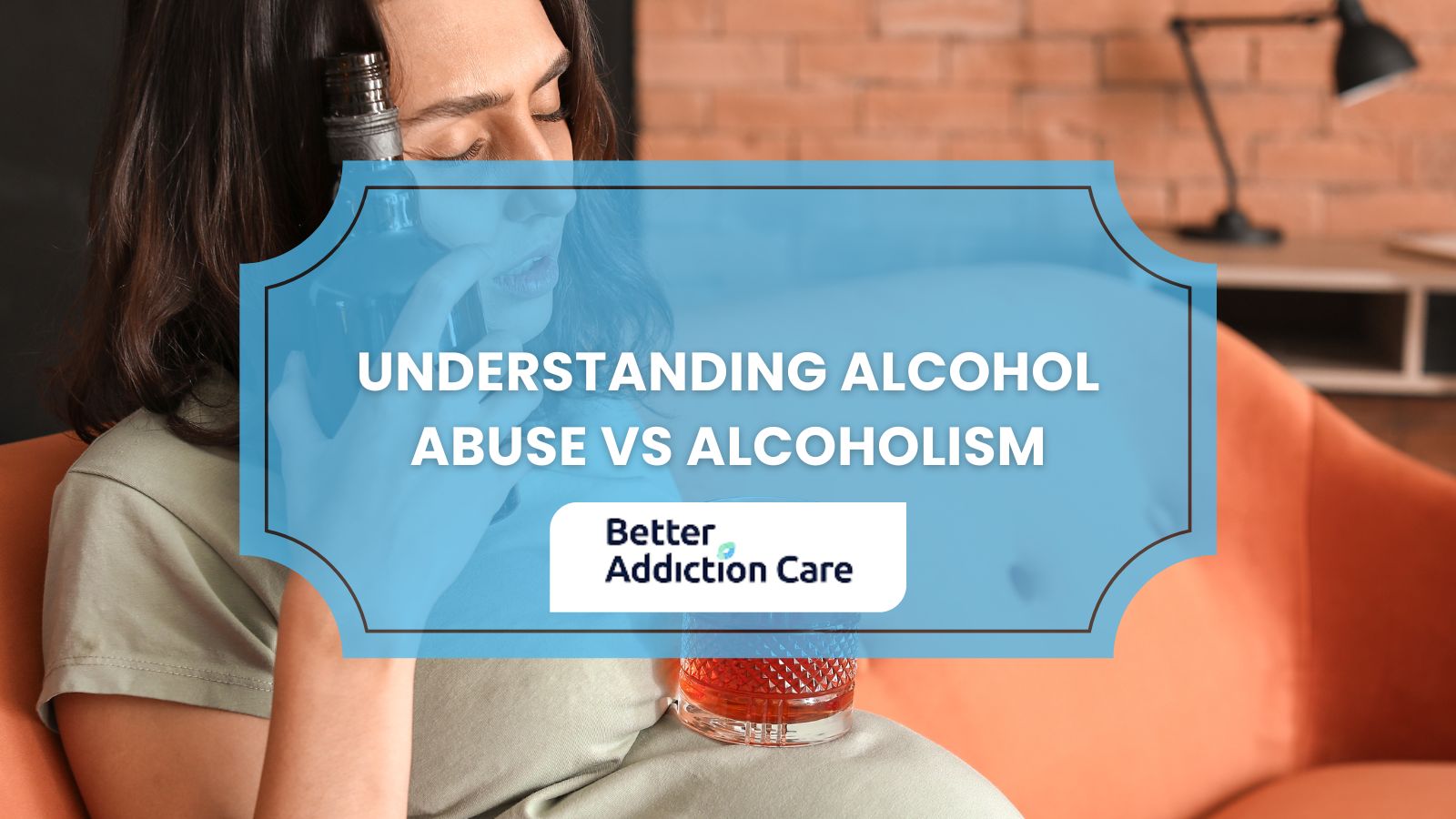
The risk factors for alcohol abuse and alcoholism include genetic predisposition, co-occurring mental health disorders, starting drinking at an early age, societal and cultural influences, and environmental factors such as peer pressure.
According to the 2023 National Survey on Drug Use and Health, 60.4 million adults ages 18 and older, nearly one in four American adults (23.5%), engage in binge drinking monthly, demonstrating the widespread nature of problematic drinking behaviors.
Treatment for both alcohol abuse and alcoholism includes approaches like therapies, medications, and support groups like Alcoholics Anonymous (AA) are common options.
What Are The Key Differences Between Alcohol Abuse and Alcoholism?
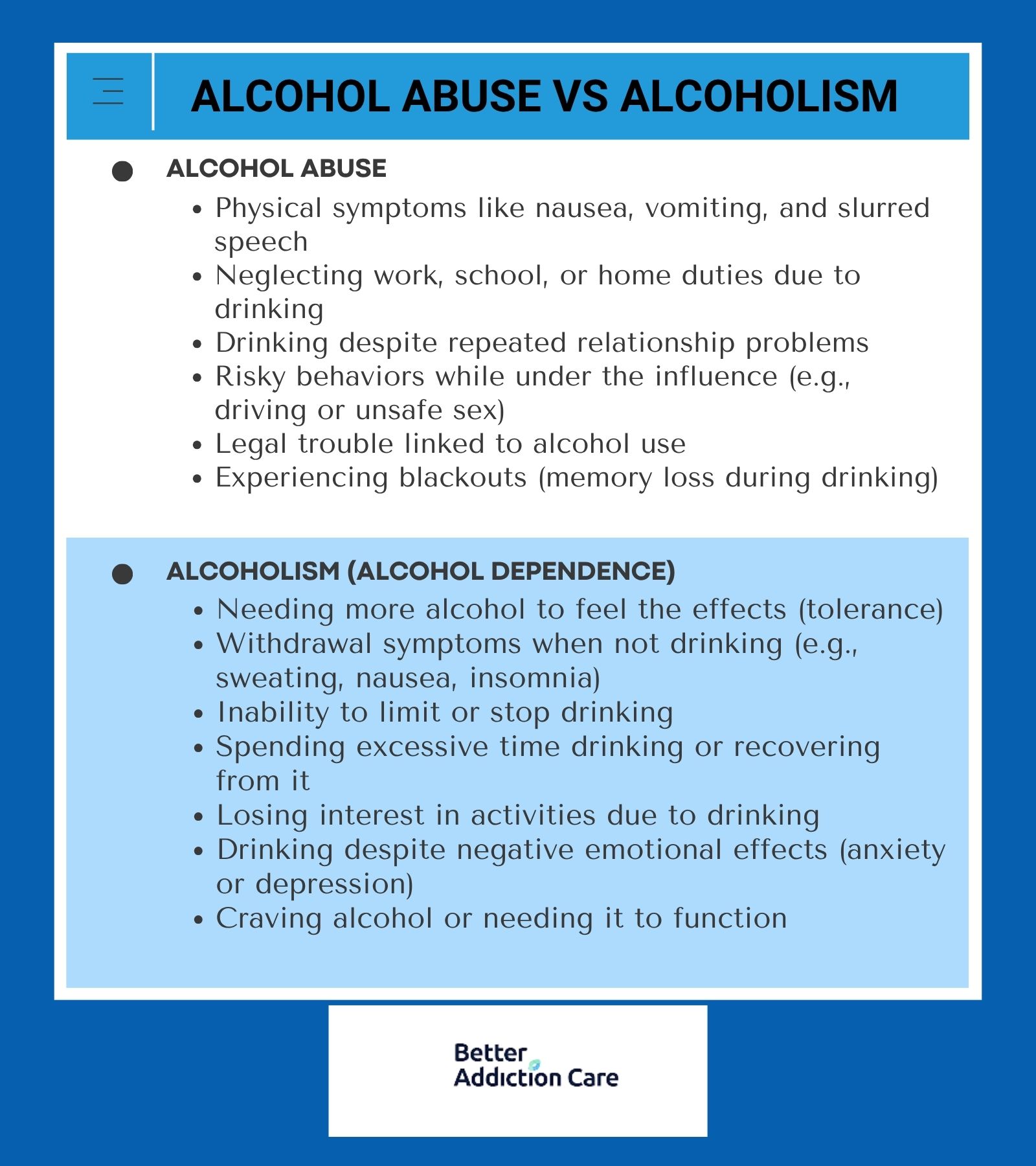
The key differences between alcohol abuse and alcoholism are their severity levels, dependency patterns, control mechanisms, physical withdrawal symptoms, behavioral manifestations, problem recognition, and medical classifications. Understanding these distinctions helps identify whether someone is engaging in problematic drinking behaviors or has developed a chronic dependency condition that requires professional intervention.
Here’s a quick comparison table to help you understand where you or someone you know might stand.
|
Aspect |
Alcohol Abuse |
Alcoholism (AUD) |
|
Definition |
Problematic drinking that causes negative life consequences |
Chronic condition involving mental and physical dependency on alcohol |
|
Quantity-Based |
Often defined by exceeding 2 drinks/day for men or 1 drink/day for women |
Not defined by quantity; based on psychological dependence |
|
Control Over Drinking |
Some control is maintained; limit intake in certain situations |
Loss of control; compulsive need to drink despite consequences |
|
Physical Dependence |
No physical dependence; withdrawal symptoms are uncommon |
Strong physical dependence; withdrawal symptoms occur when not drinking |
|
Behavioral Impact |
Risky behavior, legal issues, or neglecting responsibilities |
Persistent behavior centered around obtaining and consuming alcohol |
|
Recognition of Problem |
May recognize the issue and attempt to cut back |
Denial or inability to recognize the severity of the addiction |
|
Medical Term |
Not typically diagnosed as a disorder |
Known medically as Alcohol Use Disorder (AUD) |
|
Progression |
Progresses into alcoholism if not addressed |
Represents a more advanced and chronic stage of alcohol abuse |
How To Identify Alcohol Abuse vs Alcoholism?
To distinguish between alcohol abuse and alcoholism, you need to look for signs like neglecting responsibilities, risky behaviors, and legal problems for alcohol abuse, while alcoholism shows signs of physical dependence, including withdrawal symptoms, increased tolerance, and inability to quit or control drinking.
Signs and symptoms of alcohol abuse include:
-
Nausea, vomiting, slurred speech, and slow reflexes
-
Often neglecting responsibilities at work, home, or school due to drinking
-
Alcohol consumption despite having recurrent interpersonal problems due to drinking
-
Repeatedly engaging in risky behaviors under the influence of alcohol (driving, swimming, using machinery, or having unsafe sex)
-
Having legal problems directly or indirectly linked to alcohol consumption
-
Experiencing memory lapses, also known as "blackouts," while drinking
In contrast, alcoholism involves a chemical or physical dependence on alcohol, with these signs and symptoms:
-
Requiring more drinks to obtain the desired effect or having a decreased effect with the usual number of drinks
-
Alcohol withdrawal symptoms when not drinking (trouble sleeping, restlessness, nausea, sweating, a racing heart, or even seizures)
-
Being unable to quit drinking or drink in moderation
-
Spending a lot of time drinking or getting over its effects
-
Finding that drinking or its effects interfere with other activities or interests
-
Continuing to drink even if it makes you feel depressed or anxious
-
Wanting a drink so badly that you couldn't think of anything else, or needing alcohol to function, and feeling unable to cope without it
What Are The Risk Factors for Alcohol Abuse/ Addiction and Alcoholism?
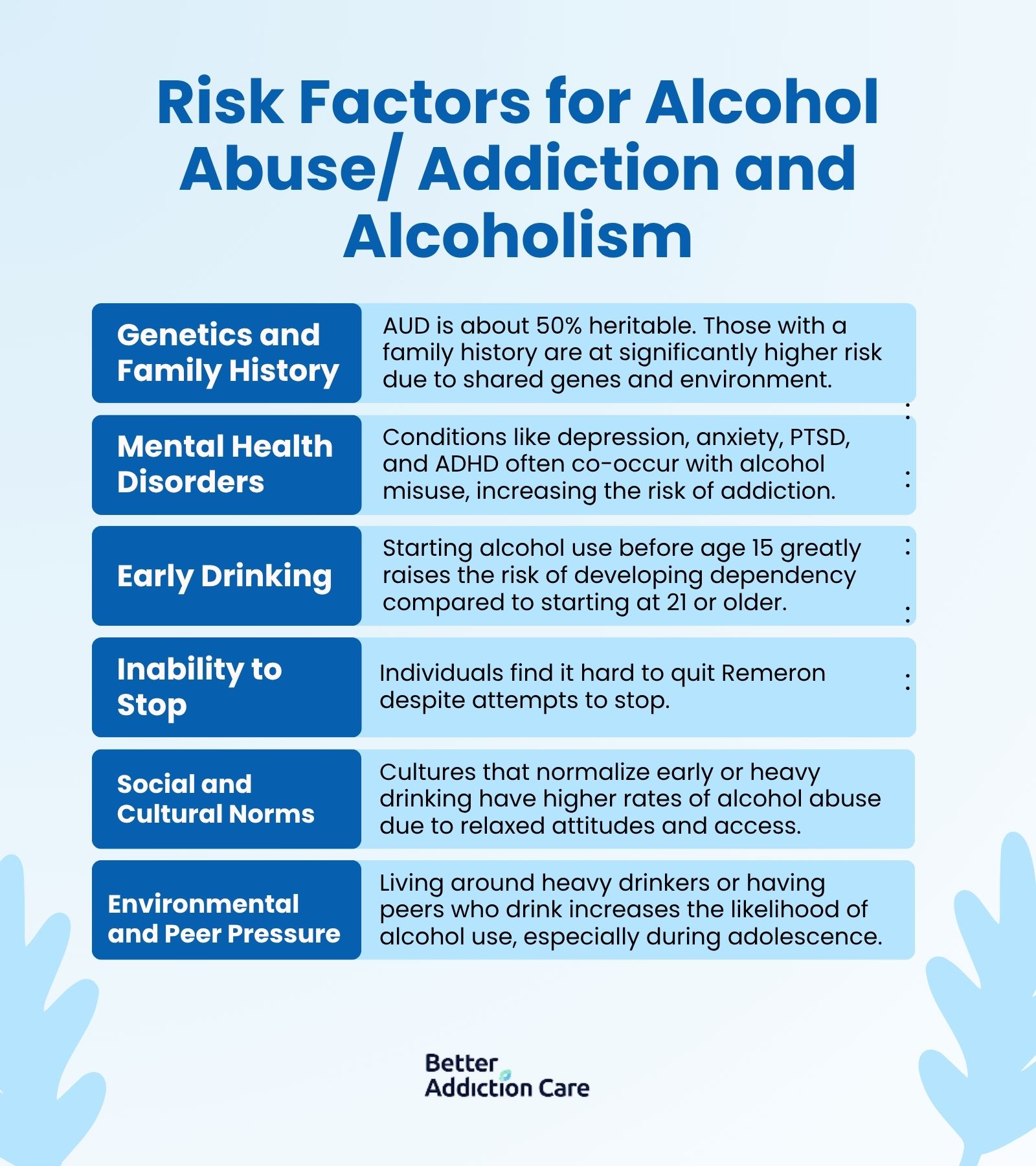
The risk factors for alcohol abuse, alcohol addiction, and alcoholism include hereditary influences, psychological conditions, early initiation of drinking, societal norms, and environmental pressures. These interconnected factors work together to increase an individual's vulnerability to developing alcohol addiction, with some people facing higher risk due to combinations of genetic predisposition, mental health challenges, and exposure to drinking behaviors in their social environment.
Here are the common risk factors for alcohol abuse and alcoholism:
-
Genetics and family history: Genetics and family history significantly influence alcohol use disorder (AUD) development. Family and twin studies consistently demonstrate that AUD runs in families, indicating a strong hereditary component. Multiple genetic variants work together to increase or decrease risk by affecting alcohol metabolism, brain response to alcohol, and withdrawal symptoms. Family history of alcohol problems serves as one of the strongest predictors of developing AUD, as individuals with affected parents or siblings face significantly higher risk due to shared genetic vulnerabilities and environmental factors. According to Zhou, H.’s 2024 study, ‘Human genetics and epigenetics of alcohol use disorder’, family and twin studies have reported approximately 50% genetic heritability for alcohol use disorder, meaning that about half of a person's risk for developing AUD comes from their genes, with scientists being 95% confident that this percentage falls between 43% and 53%.
-
Mental health disorders: A wide range of mental health conditions, such as depression, anxiety, post-traumatic stress disorder, and attention deficit hyperactivity disorder, have been strongly associated with alcohol abuse and alcoholism.
-
Drinking at an early age: Drinking at an early age increases the risk of developing alcoholism. People who begin drinking before age 15 are much more likely to struggle with alcohol dependency later in life compared to those who start at 21 or older.
-
Social and cultural factors: The way a culture perceives drinking, alcohol availability, and sets social norms regarding drinking influences your patterns of alcohol use. Cultures where alcohol is socially accepted at an early age and heavy drinking is socially accepted have higher rates of alcohol abuse and alcoholism.
-
Environmental factors and peer pressure: Environmental factors such as peer pressure and socioeconomic status contribute to the development of alcohol-related problems. Exposure to heavy drinking within the family or close friends increases the risk as well. According to Liu, M.’s 2023 study, ‘The impact of the peer effect on adolescent drinking behavior: instrumental-variable evidence from China’, peer drinking behavior demonstrates a significant influence on adolescent alcohol consumption, with students who have peers who drink alcohol being 10.5 percentage points more likely to engage in drinking compared to those without such peers.
What Are The Treatment Options for Alcohol Abuse and Alcoholism?
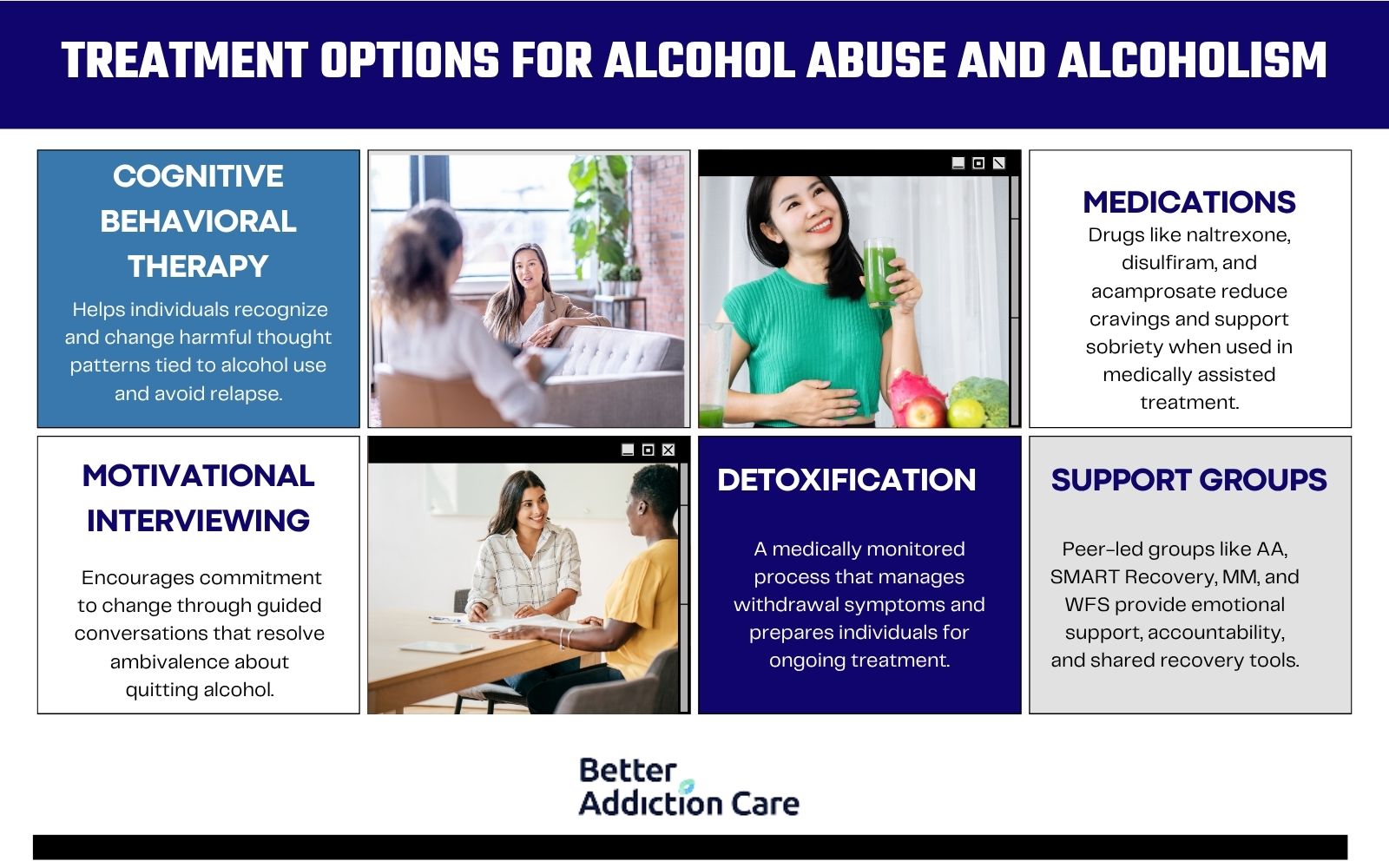
Treatment options for alcohol abuse and alcoholism include evidence-based therapies like cognitive behavioral interventions, motivational counseling approaches, prescription medications, medically supervised detox programs, and peer support networks. These comprehensive treatment modalities work together to address the physical, psychological, and social aspects of alcohol dependency.
Cognitive Behavioral Therapy (CBT)
CBT is a structured therapy that focuses on identifying harmful thoughts and behaviors related to alcohol use. CBT includes practical strategies to change these patterns and helps prevent relapse.
Motivational Interviewing
Motivational Interviewing is a client-centered approach that addresses ambivalence about drinking. It contains guided conversations that support commitment to change and help strengthen motivation to stop alcohol use.
Medications
Medications for alcohol use disorder include naltrexone, disulfiram, and acamprosate. These medications reduce cravings, block the rewarding effects of alcohol, and support maintenance of sobriety in medically assisted alcohol rehab.
Detoxification
Detoxification is a medically supervised process that clears alcohol from the body. It manages withdrawal symptoms and is the first step for people entering treatment for severe alcoholism.
Support Groups for Alcohol Abuse and Alcoholism
Support groups offer peer-based recovery support for alcohol abuse and alcoholism. They include shared experiences, accountability, and emotional guidance. Common groups are Alcoholics Anonymous (AA), SMART Recovery, Moderation Management (MM), and Women for Sobriety (WFS).
How to Help Someone with Alcoholism?
To help someone with alcoholism requires patience, understanding, and the right approach. Here are key strategies to help them through their path to recovery:
-
Educate yourself about alcoholism and addiction
-
Express concern and offer your emotional support
-
Encourage seeking professional help
-
Provide reliable resources and information
-
Encourage self-care for both them and yourself
How Do I Find Alcoholics Anonymous (AA) Meetings Near Me?
To find Alcoholics Anonymous (AA) meetings in the USA, the most direct method is to use the Meeting Guide app, provided by Alcoholics Anonymous World Services, Inc., and available for iOS and Android smartphones. This app directly accesses meeting data from over 500 AA service entities across the country, ensuring current information. Alternatively, visit the official AA.org website and navigate to their "Find A.A. Near You" section, which directs you to local AA resources, or contact your local AA intergroup or central office via phone for meeting lists and local contact details.
At Better Addiction Care, we make finding Alcoholics Anonymous meetings simple through our Find AA meetings locator tool, which provides comprehensive listings by location, time, and meeting type. Our platform allows you to search for open, closed, speaker, and specialized meetings in your area, helping connect you with local support groups that fit your schedule and recovery needs.
How Do I Find Specialized Treatment Facilities That Address Both Alcohol Abuse And Alcoholism In My Local Area?
To find specialized treatment facilities for alcohol abuse and alcoholism, identify centers offering comprehensive assessment services that determine the severity of your drinking problem and recommend appropriate treatment levels. Research facilities provide a full spectrum of care, from outpatient counseling to intensive residential programs. Contact local hospitals, mental health centers, and your insurance provider for referrals to accredited facilities experienced in treating alcohol-related disorders.
When selecting a treatment center, prioritize those employing licensed addiction specialists who understand the differences between alcohol abuse and alcoholism treatment. Effective treatment requires personalized care plans. Explore our local alcohol rehab facility directory to find centers offering evidence-based treatments for both conditions. Look for facilities providing medical evaluation services, individual and group therapy, family counseling, and aftercare programs to ensure appropriate treatment for problematic drinking patterns or severe alcohol dependency.
Related Articles
Treatment Centers in New Jersey







